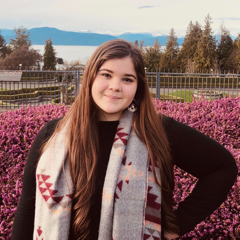
Emily King
Law students wear many hats, and at Osgoode, many students also wear the hat of being community organizers. I had the honour of interviewing 12 JD students about their involvement in various social justice movements and community initiatives this past year. Here is an overview of their work.
Emily King (3L) is from the Georgian Bay Métis community in Penetanguishene, Ontario. She is Co-Chair of the Osgoode Indigenous Students’ Association (OISA).
Emily highlighted the work of OISA, whose mandate is to “provide a supportive community base for Indigenous students and allies alike, which fosters a culturally-appropriate learning environment, while bringing legal issues involving Indigenous peoples to the attention of the Osgoode community at large.” Emily was drawn to being involved with OISA’s work because of her “recognition of the lack of safe spaces for Indigenous folks in the legal institution, and the need for more education and awareness for non-Indigenous Osgoode community members.”
Over the past year, “OISA did a lot of ‘looking in,’” she said. “We worked to provide support for our upcoming Indigenous students and we also organized a few awareness campaigns. OISA has also put together a mentorship program for incoming Indigenous students. “We connect them with upper-years and reach out at different times, have talking circles, and we offer some community support that way.”
“One of our main awareness campaigns was the Orange Shirt campaign that happened at the beginning of the year. We had drummers from Council Fire [Native Cultural Centre] come in, and it was a great awareness campaign about residential schools. We encouraged the Osgoode community to wear orange to raise awareness.”
Moreover, members of OISA attended the Indigenous Bar Association conference. “We got together and chatted amongst many Indigenous students across the country.” Another initiative that OISA organized is the Red Dress campaign, which “highlights missing and murdered Indigenous women and girls and others, and what we as a society need to do to address those ongoing concerns,” Emily said.
“We’re also in partnership working on awareness for the movement behind the Wet’suwet’en land protectors. We are in the midst of presenting some information with regard to this campaign as well.” OISA has also put together a mentorship program for incoming Indigenous students. “We connect them with upper-years and reach out at different times, have talking circles, and we offer some community support that way.”
In her capacity as Co-Chair of OISA, Emily has also been working with Osgoode faculty members on Indigenous content support and on how to implement the Truth and Reconciliation Commission’s call to action #28 at Osgoode.
When asked about how community involvement informs her work as a law student, Emily spoke about her community obligations. “Within my community, I have particular obligations to upcoming generations and to the water and land. I see that emanating through my work as a law student. It feeds into my work in everyday tasks and informs everything that I do.”
